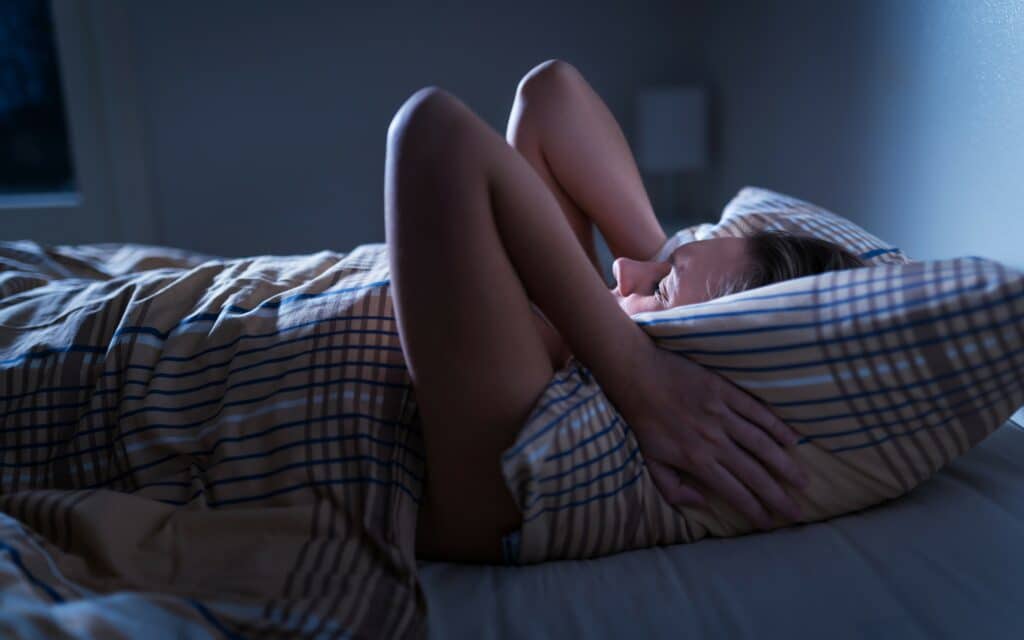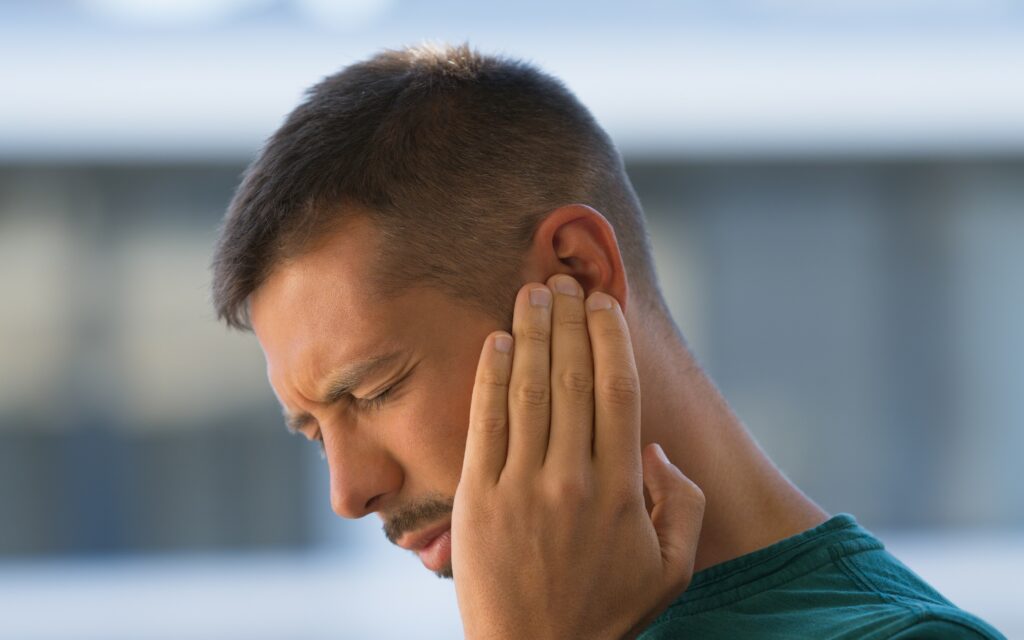Does lack of sleep cause ringing in the ears, or problems with hearing loss? Today we’re going to look at whether there’s direct or indirect relationship between insomnia and tinnitus. So, are you all ears?
It may seem like an unusual question, but for the estimated 50 million people suffering from tinnitus, insomnia can often seem to make the situation a lot worse.
Tinnitus is the name given to the sensation of hearing ringing, or buzzing inside of your ears, caused by something within your ear structure itself. This condition can range from being mild and frustrating to completely debilitating. Some people even struggle to communicate as a result of the extreme ringing they experience.
Ringing in the ears can naturally make it harder to get a good night’s sleep. Particularly if you’re not used to any sensation from your ears. Additionally, research suggests insomnia could be responsible for making your tinnitus a lot worse. Let’s look at the facts about insomnia and tinnitus.
Can lack of sleep cause tinnitus?
Insomnia and tinnitus have a stronger connection than most people think. Tinnitus makes sleeping difficult, while lack of sleep can also make your ear ringing issues worse. Poor sleep increases stress and anxiety, which can make you more hyper-focused on the experience of ringing in your ears.
But does lack of sleep cause ringing in the ears directly?
As far as scientists know, sleep deprivation doesn’t cause tinnitus, but it can make the condition feel much worse than it is. Some of the most common causes of tinnitus include:
- Exposure to loud noises (like explosions or gun shots)
- Hearing loss
- Brain or hearing-related tumors
- Earwax build-up
- Damage to the ear canal
- Meniere’s disease
- Poor circulation
- Ear infections
- Anemia
- Thyroid issues
If you notice a sudden onset of tinnitus for any reason, just like if you were to start suffering suddenly from insomnia, it’s best to seek help from a medical professional. Your doctor will need to examine you carefully to check for signs of other issues, which could be causing your condition. Don’t ignore tinnitus, as it can be a symptom of something more serious.
While tinnitus isn’t directly caused by insomnia, studies show insomnia and tinnitus are linked. Lack of sleep prompts a greater perceived loudness and severity of tinnitus.

Does lack of sleep cause ringing in the ears and ear pressure?
Insomnia has a complex impact on the body and mind. When you’re unable to sleep, your concentration suffers, your mental health declines, and you can even suffer physically too. Studies have found insomnia can have an impact on blood circulation throughout the body.
Poor blood flow has a direct impact on your health in a multitude of ways. It can even influence the way your “inner ear” works. The tiny hairs, or cilia in your inner ear rely on the correct blood flow to function properly. It allows them to detect sounds and send them to your brain.
So, to answer the question: ”does lack of sleep cause ringing in the ears?”, it’s important to note there’s not a direct causal relationship. It’s the negative effect of the insomnia on your blood vessels and flow.
If your blood flow is diminished, this can lead to feeling of ear pressure, hearing loss and even ringing.
Research conducted by doctors in the Henry Ford hospital of Detroit also found people with ear and hearing disorders will usually have more adverse ear symptoms, when they don’t sleep properly.
According to the report, tinnitus is a condition which involves a variety of emotional, cognitive, and psycho-physiological processes, often leading to various additional issues. Sleep complaints generally increase reports of emotional and physical distress from the tinnitus.
Looking at a total of 117 patients for a period of 2 years, the report found the severity of tinnitus symptoms often changed for patients, when they had a bad night’s sleep. Perhaps even more importantly, when patients were treated for their sleep issues, they also found the tinnitus improved.
Conclusively, lack of treatment is problematic for insomnia and tinnitus sufferers. The tinnitus makes the sleep issues worse, as more sensitivity to the ringing and emotional disturbances lead to problems falling and staying asleep.
How to sleep with tinnitus: The tinnitus pillow and pillow speakers
For patients suffering from lack of sleep and tinnitus, the key to a successful treatment will involve examining both parts of the issues correctly. Scientists are currently looking into treatment methods, which involve using sound-emitting devices.
Patients can wear the devices during sleep to “tune out” tinnitus sounds in the same way they would ignore external sounds.
Researchers believe inundating the brain and mind with sounds to focus on from an external source, like white noise or relaxing melodies, also trains the brain to ignore internal sound.
The stimulation of the limbic and auditory systems during sleep using these devices could help to improve a person’s chances of getting a good night’s sleep. This will simultaneously lead to an improvement in tinnitus symptoms.
On the market there’s things like:
- A tinnitus pillow —here’s a link to the Sound Oasis Sleep Therapy Pillow
- Pillow speakers —here’s a link to our extensive guide on pillow speakers.
Outside of finding ways to ignore the sound or tune out tinnitus, patients can also take various steps to improve their sleep hygiene routine. Quick tips for those wondering how to manage insomnia and tinnitus may include:
Speak to your doctor
If you suffer from insomnia or tinnitus, the best thing you can do is speak to your doctor. They’ll be able to offer personalized treatment recommendations based on your situation and may provide sleeping medication for severe cases.
Avoid alcohol
While alcohol may seem to help with relaxation for people with trouble sleeping at first, it quickly becomes a problem by changing the way your mind and body works. Alcohol may exacerbate your symptoms of tinnitus.
Stay away from stimulants
Stimulants like coffee and tea might help to keep you awake during the day, but they can also make it harder to sleep at night. If you struggle to sleep, cut down on these substances later in the day.
Exercise
Keeping active during the day will help to get your circadian rhythm back on track, particularly if you exercise outdoors, in the sunlight. Exercise can also help you to wear yourself out in time for sleep.
Find a routine
Implement a routine where you can spend a little time winding down before bedtime and reducing your exposure to things like blue light. Practice meditation or yoga to help you relax or consider journaling as a way to express your worries.
Update your bedroom
Improving your bedroom environment with a focus on sleep hygiene can be an important way to ensure a better night’s sleep. Avoid using the bedroom for anything other than sleep, relaxation and sex. Make sure your environment is comfortable too, with no unwanted light breaking through the curtains, and no unwanted noise.
Remember, following a consistent routine when it comes to going to sleep and getting out of bed each morning can be helpful too. A schedule for sleep can make a huge difference to your sleep strategy.

Can you get ringing in your ears from a lack of sleep?
Insomnia and tinnitus are part of a complex cycle for poor sleep and sleep disruption. While insomnia doesn’t cause tinnitus, a poor sleep pattern could affect you more long-term than you might think. Insomnia makes various conditions worse.
There are actually many conditions connected to both hearing loss and insomnia. Since lack of sleep can damage blood circulation throughout the body, including in your ears, it can make it harder for you to hear normally.
Over time, extended sleep deprivation can lead to sensations of ear pressure and hearing loss. The same issues with circulation could also lead to problems with cardiovascular disease, and overall heart health.
There’s also a potential connection between poor sleep, hearing loss, and sleep apnea. According to some studies, around 43% of people with insomnia already have sleep apnea – a condition known for causing breathing problems and restlessness.
People with severe sleep apnea can wake up as many as 30 times per hour. Studies also show people with sleep apnea can have larger amounts of plaque in their blood vessels, particularly if the apnea is caused by weight issues.
More plaque in the blood vessels restricts blood flow, which again has an impact on your hearing.
Dealing with insomnia and tinnitus
Lack of sleep and tinnitus are two closely connected conditions, both capable of making the other worse, or more prominent. While insomnia doesn’t cause tinnitus directly, it can make your condition worse, which also makes it harder for you to sleep, leading to a dangerous cycle.
If you’re suffering from sleep issues, like insomnia, and tinnitus at the same time, the best thing you can do is seek out a dedicated treatment plan from your doctor.
Most of the time, this treatment strategy will involve using a combination of methods, including good sleep hygiene, and strategies for blocking out internal noise, to help you sleep.
Siestio. Sleep Matters.
Now read these:
—How to sleep after liposuction
—How to sleep with toothache
—Sleeping after shoulder surgery
Medical disclaimer
You must not rely on the information provided on our website as an alternative to medical advice from your doctor or other healthcare professionals. For more information read our full disclaimer here.







